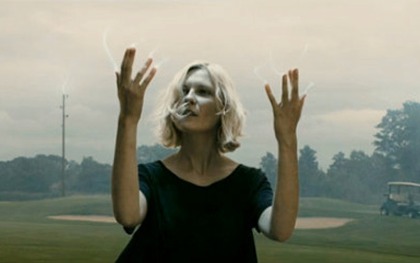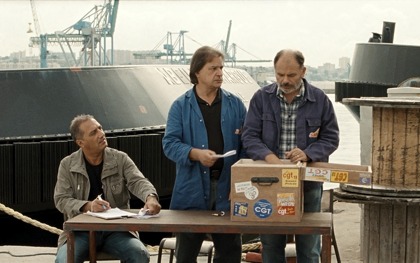Festivals
Cannes 2011: The S&S blog
Cannes auteurs AOC?

Kirsten Dunst in Lars von Trier’s Melancholia
Jonathan Romney, 18 May
There’s one topic that’s on everyone’s lips in Cannes this year, but it isn’t a film. It’s the fact that for the first time, people entering screenings in the Palais are having all food and drink removed from their bags, even bottles of water. The idea of getting through a whole competition without a quart of Evian at your side is cruel and unusual indeed, and although this year’s programme doesn’t feature much, if anything, over the two-hour mark, I can remember some years when the running times were so exhausting that if the festival organisers had tried to pull this stunt, either there would have been riots or they would have needed ambulances stationed on the Croisette.
Fortunately this year’s competition has been fairly light and pretty refreshing in itself. Not that there was much to refresh cinema itself. What you really hope to find in Cannes competition is something that will rewrite the rules of cinema, or at least show you a few shapes that you’ve never seen before. This year there was very little of that. At the time of writing the only films that have offered genuine innovation, however contentious, were Terrence Malick’s The Tree of Life and Lars von Trier’s Melancholia (Denmark/Sweden/France/Germany), and not everyone was enthused by the cosmological pretensions of either.
The von Trier is certainly intensely strange, though – a story about the end of the world that begins with a ‘prelude’ comprising the director’s most dream-like images to date (a dying horse, Kirsten Dunst as Ophelia, a Brueghel painting in flames), then offers a Festen-like comedy of manners set at a wedding party, before concluding with a final-shot apocalypse that was disconcertingly MTV in style, yet eerily touching too.
But at the end of a week, it’s very striking how many of the best films have come from directors doing what they do best – and altogether what you expect them to do best – for the umpteenth time. In competition, there were superb films by the Dardennes (The Kid with a Bike) and Aki Kaurismäki (Le Havre), and in Un Certain Regard a typically rigorous Bruno Dumont (Hors Satan) and an at least partial return to form by Robert Guédiguian (The Snows of Kilimanjaro, France). Each of these films could justly be described as a quintessential work of their respective directors. Now there’s much to be said for filmmakers staying true to form – and all these films were intensely satisfying. But a great part of the pleasure they offered was quite simply the recognition factor, which allows you to say either, “they haven’t lost it,” or “they’ve got it back”.

Robert Guédiguian’s The Snows of Kilimanjaro
Samuel Beckett and Eric Rohmer, in their respective fields, are perennial examples of names invoked in defence of artists who stay true to form. But a prevalence of such filmmakers can weigh Cannes down with the reassuring pleasure of the familiar – and offer a warm hug to critics, especially France’s hardcore auteurists, who love to see the masters doing what they do. Curiously, in Woody Allen’s opening film Midnight in Paris, one of the artists held up as an icon of 1920s white-heat creativity was Luis Buñuel, who rarely did the same thing more than twice, and for whom shape-shifting was as much part of the pleasure of creation as it clearly is for the erratic but always provocative von Trier. Another name from 1920s Paris that Woody Allen could have had his hero meet was Stravinsky, another great shape-shifter. We don’t expect a Rite of Spring in Cannes every year, but von Trier is the only Igor in this year’s competition so far.
See also
Flanders reviewed by Hannah McGill (July 2007)
Weight of water: Jonathan Romney on the Dardenne’s The Son (April 2006)
The Last Mitterand reviewed by Ginette Vincendeau (August 2005)
How do you solve a problem like von Trier?: José Arroyo on the director’s Dancer in the Dark (September 2000)
À la Place du coeur reviewed by Elisabeth Merriman (October 1999)
